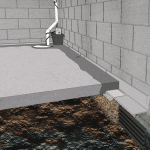Basement waterproofing is a crucial process that involves preventing water intrusion and moisture buildup in the foundation of a building. While its primary purpose is to protect the structural integrity of a property, basement waterproofing also offers several energy-efficient benefits.
Basement Waterproofing Definition
It is the application of techniques and materials to prevent water from penetrating the basement walls and floors. A waterproofed basement provides a range of benefits, including but not limited to:
- Enhanced energy efficiency;
- Improved indoor air quality;
- Protection against structural damage caused by water-related issues.
Depending on the particular situation, each person can find more in basement waterproofing. Whether just making your home comfortable or adding extra space, Will Fix got you covered.
Types of Basement Waterproofing
Interior Waterproofing
Interior waterproofing is applied from within the basement and involves creating barriers to prevent water from entering the living space. This method is suitable for addressing minor water seepage and moisture issues. It often involves waterproof coatings, sealants, and wall and floor membranes to repel water and direct it toward a sump pump or drainage system. It can be cost-effective, particularly for homes with minimal water intrusion problems.
Integral Waterproofing
It involves incorporating waterproofing agents directly into the concrete mix during batching. These additives chemically react with the concrete, creating a denser, less porous structure that resists water penetration.
Exterior Waterproofing
Exterior waterproofing is an advanced and comprehensive approach to preventing water infiltration. It is ideal for homes with significant water issues or poor drainage around the foundation. This method involves excavating the soil around the basement walls, applying waterproof membranes, and installing drainage systems to redirect water away from the foundation. By addressing water issues at their source, exterior waterproofing offers long-term protection for the building’s foundation.
The Role of Concrete in Basement Waterproofing
Concrete plays a vital role in basement waterproofing, as it is the primary material used in constructing the foundation and basement walls. Concrete is inherently porous, allowing water to seep through it if not adequately protected.
Admixtures for Concrete
These are chemical compounds added to the concrete mix to improve its properties, including water repellency. Hydrophobic admixtures, for example, create a water-repellent barrier within the concrete, reducing water absorption and enhancing its resistance to moisture intrusion.
Concrete is a versatile and durable material widely used in construction, making it a fundamental component of basement waterproofing. The foundation and basement walls can resist water intrusion and remain structurally sound by applying waterproofing measures to concrete during construction.
Moreover, concrete’s ability to retain and radiate heat contributes to energy efficiency in the basement. A waterproofed and insulated basement made with concrete acts as a thermal mass, helping to regulate indoor temperatures and reducing the need for excessive heating or cooling.
Enhanced Insulation and Energy Conservation
Basement waterproofing plays a vital role in maintaining the overall temperature of a building. By preventing water seepage and moisture buildup, it helps create a dry and controlled environment in the basement area. As a result, it significantly reduces the need for excessive heating or cooling, leading to improved energy efficiency and lower utility bills.
A dry basement provides a solid foundation for adequate insulation, preventing thermal energy losses through the walls and floor. Insulated basements help regulate indoor temperatures, making maintaining a comfortable living environment throughout the year easier. Homeowners can expect reduced energy consumption and minimized greenhouse gas emissions, promoting a greener, more sustainable living space.
Improved HVAC Performance
Humidity and moisture in the basement can negatively impact the performance of heating, ventilation, and air conditioning (HVAC) systems. Excessive moisture creates an environment conducive to mould and mildew growth, leading to clogged air filters and reduced HVAC efficiency. When the HVAC system has to work harder to compensate for the moisture-related challenges, energy consumption increases, resulting in higher utility bills and unnecessary strain on the equipment.
Mitigation of Air Leaks
Basement waterproofing in Toronto also helps seal potential air leaks in the building’s foundation. Air leaks can be a significant source of energy wastage, as they allow conditioned air to escape from the living space while letting unconditioned outdoor air enter. This compromises indoor comfort and forces heating and cooling systems to work harder to maintain desired temperatures.
You can minimize air leaks through effective waterproofing techniques, such as sealing cracks and gaps in the basement walls and floors. Timely window replacement is also a great idea to increase your home’s energy efficiency. As a result, the building’s overall energy efficiency improves, and homeowners enjoy a more comfortable living environment with stable indoor temperatures.
Prevents Mold and Mildew Growth
Excess moisture in basements creates a favourable environment for mold and mildew growth. These microorganisms pose health risks and contribute to poor indoor air quality. When mould spores become airborne, they lead to respiratory issues and allergies.
Basement waterproofing prevents moisture buildup, eliminating the conditions necessary for mould and mildew to thrive. Homeowners can enjoy improved indoor air quality by keeping the basement dry, reducing the need for additional energy-consuming air purifiers or dehumidifiers.
Long-Term Cost Savings
While basement waterproofing requires an initial investment, it offers significant long-term cost savings. Homeowners avoid expensive repairs and renovations by preventing water damage and structural issues caused by moisture. Additionally, the energy-efficient benefits of basement waterproofing, such as reduced heating and cooling costs, lead to consistent savings on utility bills year after year.
Furthermore, a dry and well-maintained basement increases the property’s overall value. Should homeowners decide to sell in the future, the basement’s improved energy efficiency and protection against water-related damages can be attractive selling points, potentially leading to a higher resale value.
Final thoughts
Basement waterproofing offers numerous energy-efficient benefits that positively impact homeowners and the environment. From enhanced insulation and energy conservation to improved HVAC performance and long-term cost savings, basement waterproofing is crucial in creating a sustainable and comfortable living environment. By investing in professional basement waterproofing, homeowners can protect their property, reduce energy consumption, and contribute to a greener, more eco-friendly future.
